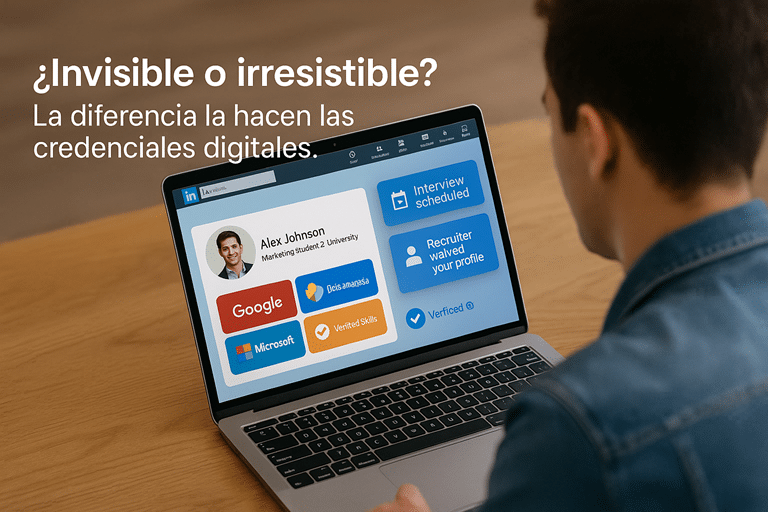Remote work has become an increasingly common modality in many organizations and companies. With the rapid advancement of technology and communications, people can do their jobs from anywhere, which has allowed for greater flexibility and efficiency in the world of work. However, this new way of working also presents challenges in how we recognize and validate employee achievements and learning. Fortunately, digital credentials have emerged as an effective solution to address this problem.
1.The importance of recognition in remote work
In remote work, it is essential to recognize and value employees’ achievements and learning appropriately. Unlike the in-person environment, where contributions and results can be directly observed, in remote work it is necessary to have effective mechanisms to evaluate and recognize the performance of workers. Recognition not only motivates and promotes job satisfaction, but also strengthens the sense of belonging and connection between members of a distributed team.
2. Challenges in recognizing achievements and learning in remote work
Remote work poses unique challenges when it comes to recognizing achievements and learning. Some of these challenges include:
Lack of visibility: In remote work, supervisors and colleagues cannot directly observe the work performed by others. This makes it difficult to identify significant achievements and learnings, as it is not always possible to have a complete view of each employee’s contributions.
Difficulty measuring impact: Determining the true impact of tasks performed in a remote environment can be difficult. Often, results are not immediate or cannot be easily quantified, making it difficult to objectively evaluate achievements and learning.
Asynchronous communication: Communication in a remote environment is often done asynchronously, meaning that not all team members are available at the same time. This can make it difficult to timely recognize achievements and learning, as feedback can be delayed.
It might interest you: From digital badges to verifiable credentials
Lack of interpersonal interaction: In remote work, personal interactions and informal moments of recognition are significantly reduced. This can affect employee morale and motivation as they do not feel valued in the same way as in an in-person environment.

3. How digital credentials can help
Digital credentials are an innovative and efficient solution to recognize achievements and learning in remote work. These are electronic certifications that validate and support the skills and knowledge acquired by an individual. Some of the advantages of digital credentials are:
Tangible evidence of achievements: Digital credentials provide tangible evidence of an employee’s achievements and learnings. These certifications may include detailed information about skills acquired, projects completed, and results achieved. By having this verifiable documentation, employees can demonstrate their capabilities objectively and reliably.
External validation: Digital credentials are issued by recognized and trusted organizations in a certain field. By earning a credential, employees gain external validation of their skills and knowledge from subject matter experts. This increases the credibility and value of achievements and learning in the work context.

What are digital badges and their examples of use?
Portability and accessibility: Digital credentials are easy to store and share in electronic format. Employees can access them from any Internet-connected device and share them quickly and securely with potential employers or colleagues. This portability and accessibility make it easy to validate and recognize achievements in remote work environments.
Continuous updating and monitoring: Digital credentials can be updated and expanded as employees gain new skills and knowledge. This allows for continuous monitoring of an individual’s progress and professional growth, even in a remote environment. Regular updates reflect the latest achievements and ensure information is relevant and up-to-date.
Recognizing achievements and learnings in the era of remote work is essential to motivate and empower employees. Digital credentials offer an effective solution to address the challenges associated with recognition in remote environments. These certifications provide verifiable evidence of employee learning, validation, portability, as well as the possibility of updating. By implementing digital credentials, organizations promote a fair and transparent environment. This way employees feel valued and recognized for their contributions.
Subscribe to blog here and receive all our content







